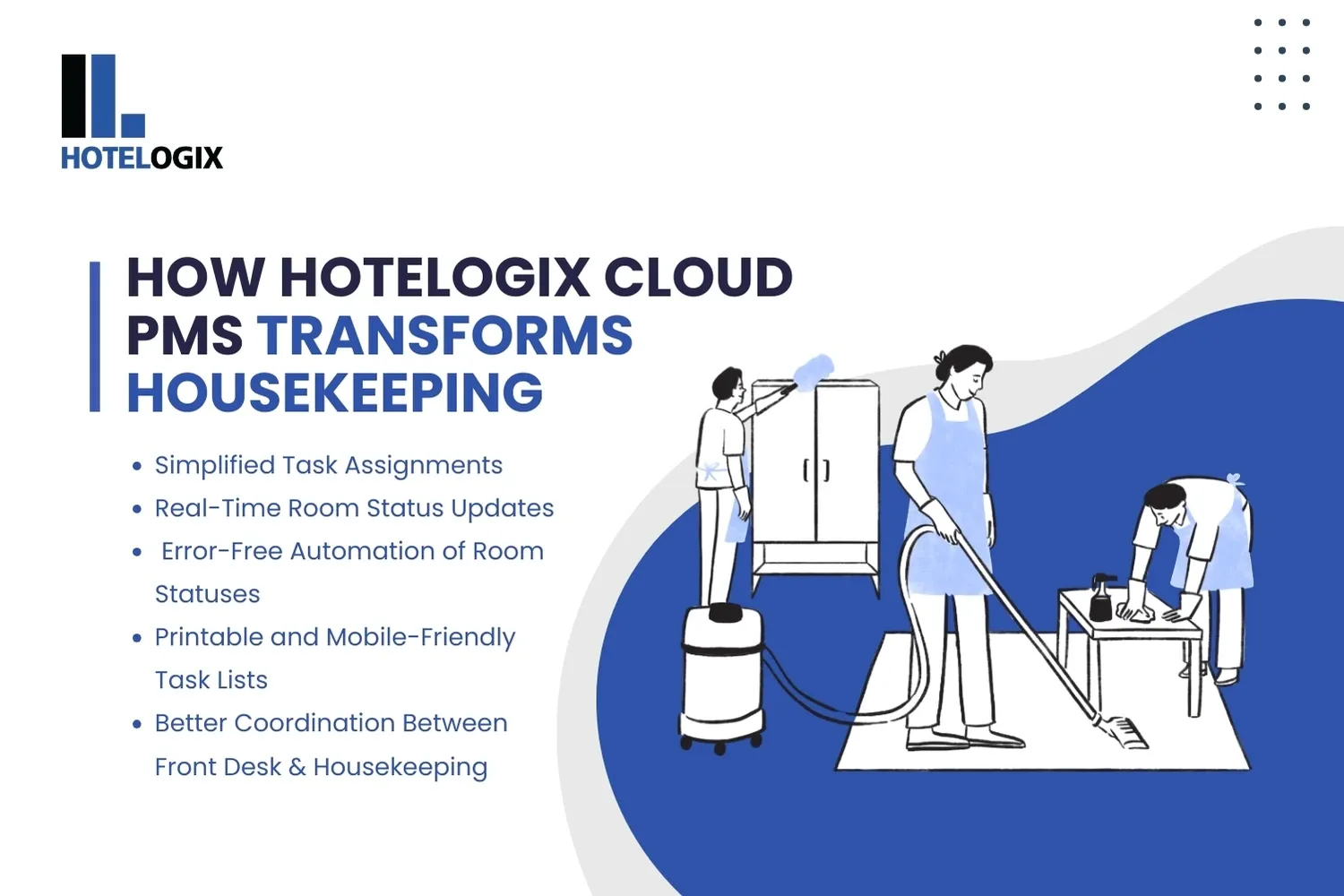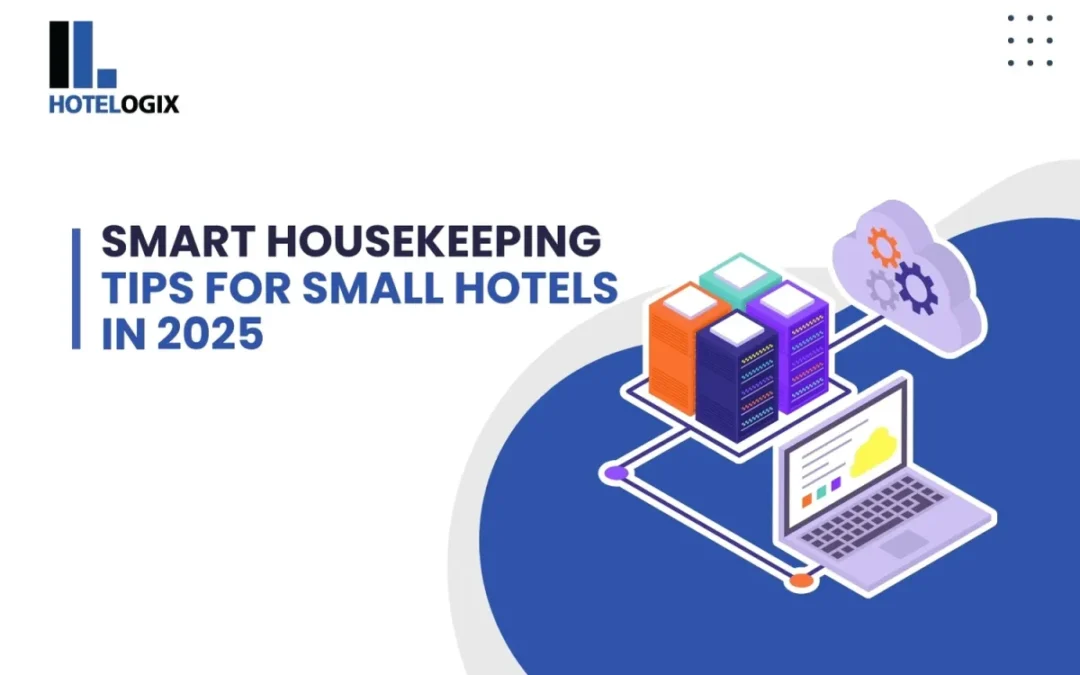Why smart housekeeping is the backbone of guest satisfaction—and how a PMS can help small hotels run it like a charm
In the world of hospitality, housekeeping isn’t just a function—it’s a silent ambassador of your hotel’s brand. It’s one of the few departments where excellent work often goes unnoticed, but even the smallest slip can lead to a flood of guest complaints. From spotless sheets to gleaming bathrooms, the work of housekeepers shapes the first impression and the last memory guests carry with them.
For small independent hotels, this essential function becomes all the more challenging due to limited staff, tighter budgets, and a lack of automation. In contrast to larger hotel chains that have full housekeeping departments, supervisors, and digital coordination tools, small hotels often operate with a handful of housekeepers juggling multiple responsibilities at once.
So, how can boutique hotels, B&Bs, and independent properties offer five-star housekeeping with a two-person team? The answer lies in automation, coordination, and real-time control—delivered by a cloud-based Property Management System (PMS) like Hotelogix.
Typical Housekeeping Duties in Small Hotels
1. Making up rooms as per guest preferences or timing
Housekeepers in small hotels often adjust cleaning schedules based on personalized guest preferences, such as late clean-ups, extra pillows, or specific fragrance preferences. This requires a flexible approach and good coordination with the front desk to ensure the guest feels prioritized.
2. Restocking in-room amenities like toiletries, towels, and coffee kits
Guests expect rooms to be fully stocked upon arrival. Housekeepers must regularly check and replenish everything from bath towels and soaps to tea/coffee kits. Even a missing toothbrush can result in a complaint or a poor review on the best hotel review website—so attention to detail is crucial.
3. Managing laundry pick-up and delivery
In smaller setups, housekeepers are often responsible for both guest and in-house linen laundry. They must coordinate timely pickups, track items accurately, and ensure delivery before the guest checks out—all while maintaining room cleanliness.
4. Handling special cleaning requests such as allergen-free rooms or deep cleans
Guests with allergies or medical needs may request chemical-free products or dust-free environments. This requires special equipment, extra time, and a keen understanding of what deep cleaning actually entails—often with no additional manpower.
5. Maintaining cleanliness in common areas like the lobby, restrooms, and staircases
Housekeepers must ensure that shared spaces reflect the hotel’s cleanliness standards at all times. This means constant rounds, especially during peak hours, to wipe surfaces, take out trash, and mop floors—without neglecting room turnovers.
6. Preparing rooms quickly between back-to-back check-ins and check-outs
Quick turnovers are a daily challenge. During back-to-back check-in and check-out times, such as when one guest departs at noon and another arrives at 1 PM, housekeepers have less than an hour to clean, sanitize, restock, and inspect the room—leaving no room for delay or errors.
Challenges in Manual Housekeeping Management
1. Rooms May Get Missed or Cleaned Late
In the absence of a digital system, rooms can slip through the cracks. The housekeeping manager may forget to assign certain rooms, or staff might lose track of tasks—leading to unprepared rooms and guest dissatisfaction.
2. Guests Might Check Into Unprepared Rooms
Miscommunication between housekeeping and the front desk is common in manual setups. A room may be marked as ready even if it’s not, resulting in awkward guest experiences and negative first impressions.
3. The Front Desk May Struggle to Get Accurate Room Status
Relying on WhatsApp, phone calls, or handwritten notes creates delays and confusion. Staff often waste time confirming which rooms are clean, inspected, or still being serviced—especially during rush hours.
4. Housekeepers Can Feel Overworked and Underappreciated
In small hotels, a single housekeeper might clean over 10 rooms a day, handle laundry, and tidy public areas. Without a streamlined system, this leads to burnout, missed tasks, and low morale.
How Hotelogix Cloud PMS Transforms Housekeeping

1. Simplified Task Assignments
Assign rooms based on checkout status, floor, or cleaning priority
Hotelogix allows managers to assign tasks using filters like checkout time, room type, or priority. This structured workflow ensures the right rooms are cleaned at the right time.
Distribute workloads evenly across a small team
With just a few clicks, tasks can be divided fairly among housekeepers—preventing overload on one person and improving productivity for the whole team.
View the day’s assignments from a central dashboard
Supervisors and staff can track their duties through a shared digital dashboard—eliminating paper schedules, verbal instructions, or confusion over who does what.
2. Real-Time Room Status Updates
Color-coded statuses like Clean, Dirty, Inspect, Under Maintenance, DNR
Each room status is instantly visible through simple color codes, helping teams prioritize their work and reduce human error in communication.
Front desk and housekeeping stay in sync
Everyone has real-time visibility—if Room 205 is under inspection, the front desk won’t accidentally assign it to a new guest. This keeps hotel operations smooth and prevents last-minute chaos.
A 2025 HotelTechReport survey found that 89% of property-based respondents said technology makes their teams happier, compared to 71% of respondents who work for brands and 61% of respondents who work in corporate roles for management companies.
3. Error-Free Automation of Room Statuses
Checkout triggers “Dirty” automatically
As soon as a guest checks out, the PMS updates the room to “Dirty,” ensuring no manual intervention is needed to signal housekeeping.
Room progresses to “Inspect” and then “Clean” post-cleaning and checks
The system moves the room through a cleaning and inspection workflow. Supervisors can mark rooms as “Clean” only after review, ensuring consistency in service quality.
Prevents miscommunication and ensures guest-ready rooms
Rooms are marked ready only after all steps are completed. This eliminates guesswork and ensures no guest ever walks into a room mid-clean or with missed details.
4. Printable and Mobile-Friendly Task Lists
Printable daily housekeeping checklists
For teams that prefer physical copies, Hotelogix offers printable task sheets that list room assignments, guest notes, and deadlines.
Mobile app access for real-time updates
Tech-savvy staff can view, update, and close tasks on their phones—reducing delays, improving efficiency, and supporting eco-friendly operations.
Task acknowledgment and completion tracking
Each staff member can tick off tasks as they go, providing supervisors with real-time visibility into what’s done and what’s pending—improving accountability.
5. Better Coordination Between Front Desk & Housekeeping
Real-time alerts when guests check out
As soon as a room becomes vacant, an automatic alert is sent to housekeeping, allowing them to start cleaning without waiting for a phone call.
Front desk is notified the moment a room is ready
Housekeeping marks rooms “Ready” from their device or system, immediately updating the front desk to assign it to waiting guests—speeding up check-ins.
Shared dashboards reduce manual follow-ups
There’s no need for repeated calls or checking-in. Everyone operates from the same interface, leading to faster service, better guest handling, and reduced stress.
The cloud-based PMS market for small and medium hotels is experiencing remarkable growth, with adoption rates increasing by 8.2% annually from 2024 to 2030. This growth is driven by the increasing need for operational efficiency and enhanced guest experiences.
Why This Matters in 2025 and Beyond
Digitally aware guests expect speed and transparency
Today’s travelers want rooms that are clean, ready on time, and matched to their preferences—without needing to ask twice. Digital coordination is no longer optional.
Flawless cleaning and instant service affect reviews and revenue
Negative reviews about cleanliness or delays can severely impact a small hotel’s reputation. One poor check-in experience can cost dozens of future bookings.
Hotelogix helps small hotels operate like large chains
Without investing in expensive infrastructure or hiring more staff, small hotels can achieve hotel chain-level efficiency and guest satisfaction with Hotelogix’s powerful cloud-based PMS.
Hotelogix: Designed for Efficiency, Built for Small Hotels
Its unified dashboard gives you a real-time view of room statuses, staff assignments, and task progress—all in one place. With one-click updates, even non-tech-savvy staff can mark rooms as clean, dirty, or under inspection in seconds. Whether it’s housekeeping or operations through the Central Reservation Office (CRO), Hotelogix ensures every department works in sync.
The system smartly balances workloads, ensuring no staff member is overburdened, while its cloud-based setup means there’s no need for servers or IT maintenance—just an internet connection. With its suite of smart Hotel Solutions, Hotelogix simplifies operations, boosts team productivity, and helps small hotels deliver five-star service with a lean team.
Final Thoughts: Technology as a Partner, Not a Replacement
In the hospitality industry, the human touch is invaluable—guests remember warm smiles and personalized service. But that doesn’t mean technology has to take a backseat. For small hotels, tools like Hotelogix don’t replace people; they support them. By automating repetitive tasks such as updating room statuses or assigning cleaning duties, staff members can spend less time on coordination and more time delivering exceptional service. The result is smoother workflows, faster turnovers, and fewer operational hiccups.
More importantly, technology helps reduce stress and burnout among housekeeping teams, allowing them to focus on quality rather than rushing through tasks. When the team feels supported and empowered, their job satisfaction improves—and that positivity reflects in guest interactions. In this way, technology becomes a silent partner, helping hotels create happy staff, happy guests, and ultimately, a stronger business.

